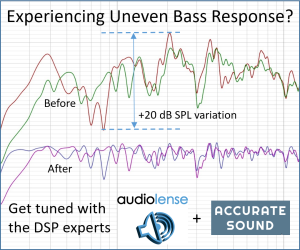Thanks Markus, but not quite. I'm hoping so see the "speaker" measurement with the EQ applied. The measurements below are "LP", albeit fairly close at 2.2m. I like your 1.5m distance, will work here for >500hz integration.
Note that at LP, (above 500hz), for example, the omni pressure mic measured some deviations >1kHz. The "corrected" response is also at LP and is now audiophile/studiophile eye friendly flattened. What we dont have is the "corrected" response at the speaker. Your example was a speaker no sane person would disagree needs "correction". Here we have a speaker that presumably needed little if any. We do have factory anechoic data for it. They differ from what is shown here.
View attachment 43558














